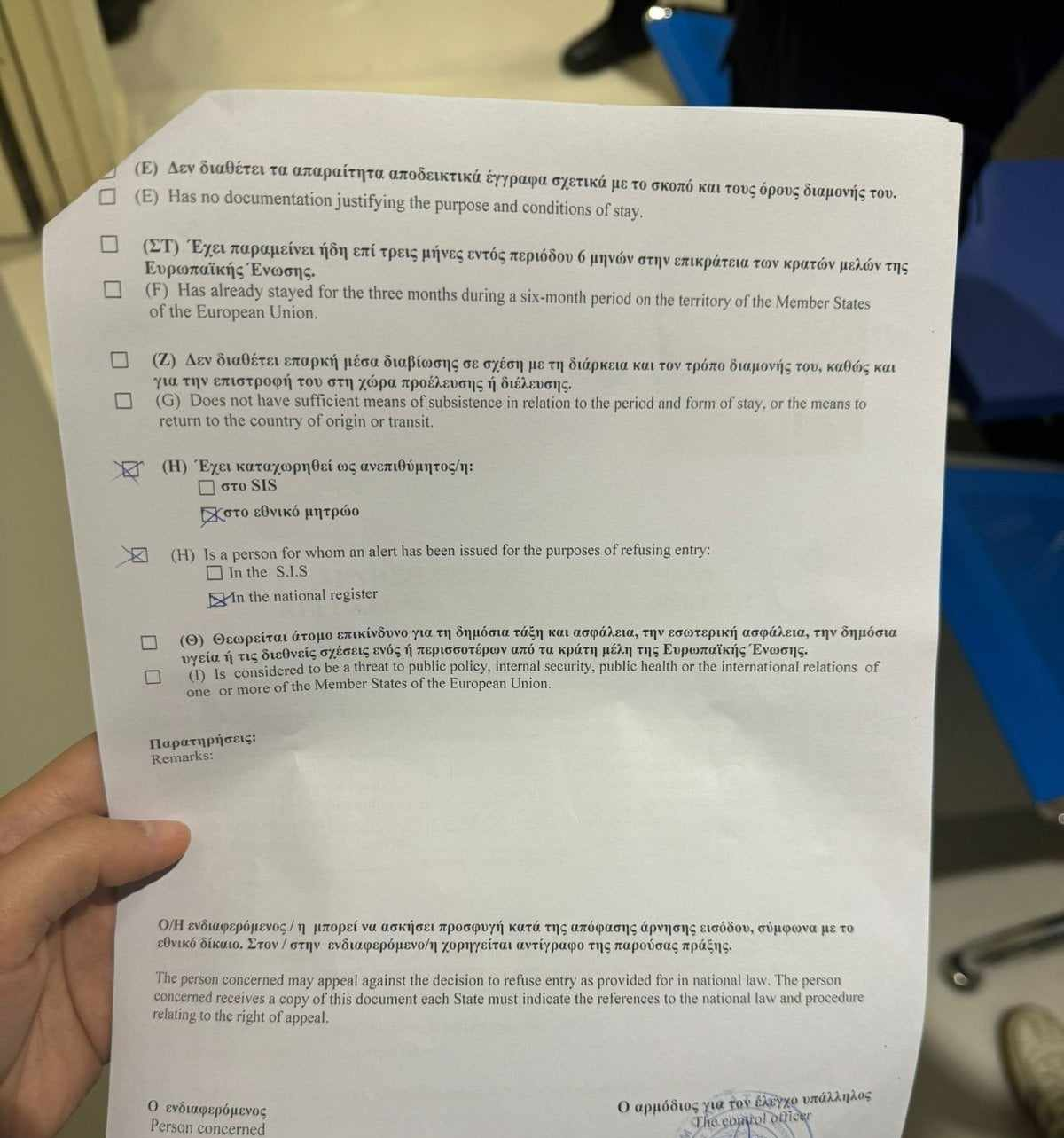
On Thursday, October 3, before the “18th Anti-Racist Festival” in Crete, the duo was detained by airport police upon their arrival at Chania Airport. “About two hours after our detention, the Greek police handed us a document stating that we were banned from entering the country. However, no reasons were given, and none of our questions were answered. Moreover, the police threatened us with deportation via a route they chose, warning that if we resisted, we would be taken to the central police station and brought to court the next morning,” they said.
However, when festival organisers and supporters arrived at the airport, turning it into a scene of protest and solidarity, the police backed down. Grup Yorum members were eventually allowed to leave the country on their own terms.
The group criticised Greece’s stance, stating, “Is it Grup Yorum, who unites peoples against imperialism, or the Greek state, filled with American bases, that threatens Greece’s security? For a government that collaborates with imperialism and the fascist Turkish regime, we are a great threat.” They went on to explain the reasons for their persecution:
“The reason is that we foster solidarity between the Greek and Anatolian people. The reason is that the Greek people see Helin Bölek and İbrahim Gökçek’s resistance as their own and rise up for their homeland. The reason is that our concerts unite the Greek people through anti-imperialist and anti-fascist values. The reason is the International Artists Front we founded in Athens, calling for unity against American imperialism. The reason is our defiant protests in the heart of Athens and our traditional concerts on the island of Lesbos.”
The band concluded by calling on the Greek state to lift the “illegal, unlawful, and arbitrary” entry ban, affirming that “Grup Yorum is no longer just the voice of Anatolia but the unyielding voice of the world’s oppressed peoples.”
Background on Grup Yorum’s entry ban
On the evening of Thursday, October 3, organisers of the 18th Anti-Racist Festival in Chania reported that two members of Grup Yorum, Sena Erkoç and Umut Gültekin, were barred from entering Greece. According to the organisers, the musicians were considered “a threat to the security of the Greek state” and placed on a list of “undesirable” individuals, despite being citizens of EU countries.
Previously, the duo had performed at events on Lesbos without issue. The organisers of the Chania festival questioned the timing of the ban, suggesting that behind-the-scenes deals between Greece and Turkey may have led to the silencing of dissenting voices.
In a video posted on social media, Sena Erkoç said, “We are Grup Yorum, invited guests of the Anti-Racist Festival. The Greek police detained us at the airport and refused us entry without providing a reason. But we know the real reason: we are a revolutionary, political musical group. Grup Yorum is the voice of the people, and no government can stop us.”
The entry ban document seen by ThePressProject confirmed that the musicians were listed on Greece’s National List of Undesirable Aliens (E.K.A.N.A.).
Who are Grup Yorum?
Grup Yorum is a Turkish band that blends traditional and modern sounds with a strong political message. Founded in 1985, the group has included more than 100 artists over the years, released over 20 albums, and performed in numerous countries, including Germany, Australia, France, and Greece. The band’s base of operations was the İdil Cultural Center in Istanbul.
The Turkish state has repeatedly targeted Grup Yorum, accusing members of ties to the Revolutionary People’s Liberation Party-Front (DHKP-C), which Turkey, the US, and the EU have classified as a “terrorist” organisation. Since 2016, the group has been banned from holding concerts in Turkey, and several members have been imprisoned and tortured.
Grup Yorum’s struggle gained wider recognition after the Gezi Park protests in 2013. As their influence grew, so did the state’s repression. In 2020, two of the band’s members, Helin Bölek and İbrahim Gökçek, died after hunger strikes protesting the Turkish state’s treatment of the group.
The repression of Grup Yorum extends beyond Turkey, with EU countries, particularly Germany, also clamping down on their activities. In 2019, Cologne police banned a concert in solidarity with the group, and in December 2021, German authorities even prohibited the engagement party of two members, warning it would only be allowed if no music was performed.
During the closing concert of the International Anti-Imperialist Symposium in Berlin in November 2023, which was covered by ThePressProject, German police were present and conducted a search of the venue. Despite this, Grup Yorum defiantly took the stage, waving the Palestinian flag.
______________________________________________
Are you seeking news from Greece presented from a progressive, non-mainstream perspective? Subscribe monthly or annually to support TPP International in delivering independent reporting in English. Don’t let Greek progressive voices fade.
Make sure to reference “TPP International” and your order number as the reason for payment.